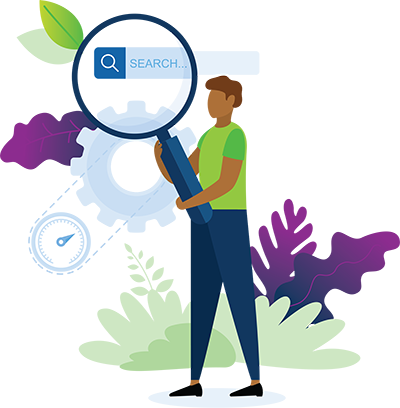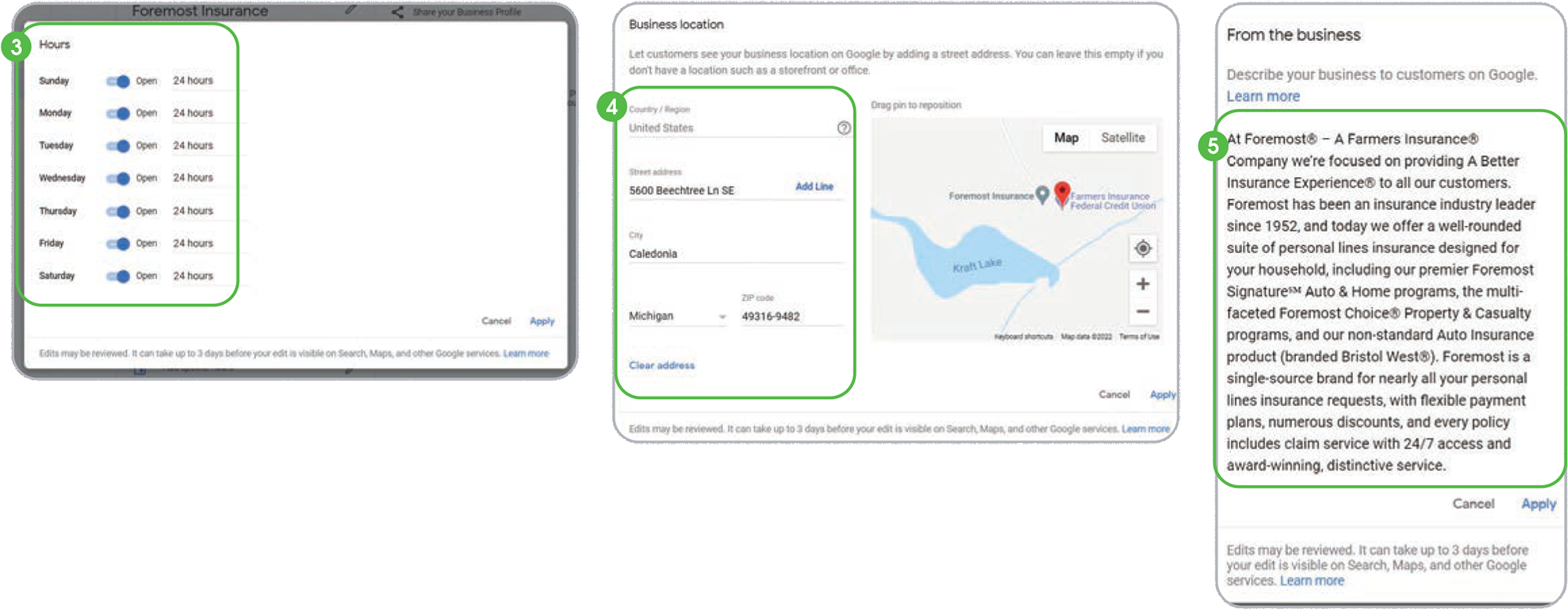Exploring Digital Marketing

In this chapter, we're venturing out of the social media realm to learn about other online spaces. We'll discuss websites and search engines (like Google), and focus on best practices for enhancing your digital marketing efforts in these areas — namely, improving search engine optimization (SEO).
It may be helpful to think of your agency's website as your virtual storefront; each digital space your agency is present on (such as Google, Yelp, Bing, etc.) is a door leading to that storefront. Your website is your primary plot of land in the digital ecosystem, where people can find your business and enter to learn more. According to Safari Digital, 62% of consumers disregarded a business they could not find online.1 Therefore, if you don't already have a website, we highly recommend creating one!
People near you may be searching for insurance — but when they look, are they able to find you? And if they do find you, does your virtual storefront make it easy for them to contact you or make a purchase? These are the questions we'll explore in the next few sections.
- Safari Digital: https://www.safaridigital.com.au/blog/local-seo-statistics/
SEO 101
What is SEO and why does it matter?
SEO is the increasing of web visibility and traffic through organic search engine results. Essentially, strong SEO makes you easier to find on the internet. Local SEO is the same thing, but for local businesses looking to connect with consumers in their communities — and this applies to insurance agencies like yours!
Local queries account for almost half of Google's two trillion searches per year.1 What do we mean by “local searches?” If a customer is looking for an insurance agency, they can search for “insurance agency near me” on search engines. A list of nearby insurance agencies will then be listed.
You're probably wondering how you can get your agency to appear in more of these local searches. The best answer to that is by being accurate and consistent.
Why are accuracy and consistency so important?

The search phrase “near me” doubled in 2020.2 So, when people are searching for “insurance agencies near me,” they're going to want to see your important information right away. What's the most important information? Your agency name, address and phone number (NAP).
- Name
- Address
- Phone Number
Keeping NAP and your other business information up to date helps increase your search engine visibility online. When all your information is exactly the same on each digital platform (your social media, website, business listings, etc.), you come off as more reliable and are easier to contact.
We recommend creating a document with your business information. Whenever you need to provide this information, you can copy and paste it from the document, and it'll be the same each time.
The more accurate your information and the more business listings you've claimed, the more likely you are to be suggested as a local option, which can drive traffic to your website.
What are business listings?

On Google, Yelp, Bing, Yahoo and other sites, you can claim your business listings. When you search for your business on these platforms, you'll find a listing for your agency. You can claim, or take ownership, of these listings, and you'll be able to get verified and keep them updated.
For Google, it's located on the right side of the search page. Out of all the search engines, Google is by far the most-used search engine, which is why we recommend creating a free Google Business Profile first by going to Google.com/business.
Note: If you don't have a website for your agency, you can easily create one through your Google Business Profile!
Your agency information is probably on numerous sites, so how do you make sure the information is correct on all of them? Unfortunately, you can't, but you can get close. The best thing you can do is update the most popular listings; the search engines will work together to cross-reference the information to check that it's correct. This won't be an overnight transformation — it'll be an ongoing process — this is where consistency comes into play.
To track down some of these listings, you can enter your business name on sites like SmallBusiness.Yahoo.com/local. You'll be able to see what listings have inaccuracies (NAP errors) and how you compare to similar businesses in reviews.
- Moz: https://moz.com/the-state-of-local-seo-industry-report-2020
- Google Trends: https://bit.ly/34rmplh
Adding, Claiming and Updating Your Agency's Google Business Listing
By claiming your business listing on Google — and keeping it current — consumers will likely see your agency as more
reputable and reliable. It makes you much easier to find and contact. Best of all, it's a free resource!
In today's digital landscape, maintaining an up-to-date Google listing is vital for your agency. People in your community are searching for “insurance near me” on Google, and some may be searching for your agency specifically. If you're not fully there online, consumers might choose someone else who is, and you may miss out on a customer!
If you don't claim and update your listing, Google and other people may try to manage your listing for you. This could lead to incorrect or inaccurate information about your agency, possibly confusing potential customers. In this way, maintaining your Google listing isn't just about marketing — it's about customer service! It could be one's first impression of your agency; if done well, it communicates to customers that you truly care about their insurance journey, every step of the way.
Here's a step-by-step walkthrough on how to add, claim and update your agency's Google business listing:
Adding and Claiming Your Agency's Google Business Listing
- Visit Google.com/business and click Mange now or Sign in.
- Click Create account on Google using your business email domain (if you don't have one).
- Search for your business. If it doesn't appear in the search, click Add your business to Google.
- Add your agency name and search for “Insurance agency” in the business category, then click Next.
- Toggle Yes if you would like to add your agency's address, and then click Next.
- Enter your agency's address and hit Next.
- The next screen will ask if you provide deliveries or home and office visits. Toggle No and then click Next.
- Enter your agency's phone number and website URL (if you have one), and then click Next.
- Click Finish.
Updating Your Agency's Google Business Listing
- Go to your Google My Business home page, where you can view your Google performance, reviews and more.
- To edit your information, click on the Info tab on the left.
- Mark the days your agency is open and provide hours.
- Double check your agency's name, address and phone number.
- You can also write a brief description of your business.

After that, you're all set! There's a lot more you can do on Google's platform (like upload photos of your agency), so try using the different features to create a robust listing. Remember to check in often to keep everything up to date and to reply to reviews.
Five Ways to Improve Your SEO
Improving your SEO doesn't necessarily mean spending a ton of money. It's as simple as correcting technical errors and providing correct information, valuable content and links. Spending more money to spruce it up can come into the picture (if you want) after these foundational points are correct.
1. Be Consistent

Here are a few common consistency errors to look out for:
Incorrect Information. Online business listings that feature your agency's NAP should all have the exact same information. Whether it's a change in phone number, address, or other data within a listing, mixed information confuses search engines. This can lead to your agency being ranked lower than businesses who have consistent information. Plus, customers may find the incorrect listing and contact the wrong number.
Duplicate Business Listings on the Same Directory. When duplicate listings are present within the same directory, search engines don't know which of the listings to trust or rank. Users experience a similar confusion when they don't know which information is correct or where to leave their reviews.
Unclaimed or Unfinished Listings. To ensure that search engines have the most accurate information, be sure to add or claim your listings, and complete every field available. If you've already added or claimed your listings, make sure you update the information as needed.
2. Correct Technical Errors

Correct all technical errors on your website. If you're feeling ambitious, go to Search.Google.com/search-console/welcome. Enter your website URL into the Google Search Console, and Google will analyze your website and provide information on opportunities for improvement.
Here are a few examples to look out for:
Broken Links. If you have links that aren't directing to the intended destinations, correct them right away. Imagine a customer clicking on a link that won't work, so they get frustrated and leave instead. You definitely want to avoid that!
Typos and Incorrect Information. Before publishing anything new to your website, be sure to have everything thoroughly reviewed. If you can avoid typographical errors and incorrect information on your website ahead of time, it'll save you time in the long run.
File Errors. Review all photos, videos and other files (like PDFs) on your website. Make sure they're showing up, have alternative (alt) text, don't look too grainy or take a long time to load. If they don't look right or are loading incorrectly, try uploading a higher quality image, a smaller file or a different file type.
There are more advanced items to check on, but they often require the assistance of a professional. If you hire a vendor to help build your website or perform an SEO audit, here are some items to have them check:
- JavaScript
- XML Sitemaps
- Site Architecture
- URL Structure
- Structured Data
- Plugins
- Content Quality
- Duplicate Content
- Outdated Content
- Hreflang Tags
- Canonical Tags
- 404 Pages
- 301 Redirects
- Robots.txt Files
3. Supply Valuable Content

Concise Writing. Providing valuable content means customers should be able to find nearly everything they're looking for on your website. And the site should be easy to navigate, so label each tab with clear text (such as, “Claims,” “Pay Bill” or “Get a Quote” instead of just “Click Here”).
Agency Blog. You can also create a blog section on your website with articles relating to your products or other general topics (as we mentioned in the Creating Content section). If this is something you're interested in, consider publishing an article at least once every three months. Blog articles are easy to share on social media and via email, and they may bring more visitors to your website. Check out Foremost.com/Learning-Center/ for inspiration!
Keywords. Consider brainstorming a list of keywords that customers might search to find you online. Examples could be “Mobile Home Insurance” or “Insurance Agent in Grand Rapids, MI”. Try naturally implementing these keywords throughout your website. Consider experimenting with tools like Answer the Public, Yoast Suggest or Google Trends™ to get a better understanding of what your customers are searching online.
4. Include Internal and External Links

The more links you have on your website, both internal and external, the better your SEO. When it comes to links, the more the merrier — as long as they're relevant!
Internal links are links on your website that direct you to other places within your website. For example, on your website homepage, you could have a section that says, “File a Claim,” with a link that takes users to your “Claims” page.
External links are links that take you to different websites. Examples of external links are links to your social media pages (which you should definitely include), blog or the websites of insurance carriers or accounts you work with (like Foremost.com).
5. Use Social Media

SEO is also associated with your social media — so keep your NAP the same on these platforms too!
Posting Frequently. To make your social media accounts more authoritative, stay active. We recommend posting about topics your customers will find relevant, interesting and informative.
Links to Website. When you post, you should also link to your website. You can say things like, “Looking for home insurance? We can help! Get a quote and connect with us at [INSERT URL].” This will act as an external link which can get more people visiting your site and help improve your SEO.
One Social Account Per Platform. Lastly, if you have duplicate social media accounts — like two Facebook pages for your agency, one that's active and another that's inactive — delete the inactive accounts. It's important to have one page on each platform. And if you only have a personal Facebook page, we highly recommend creating a Business Facebook page for your agency. This will make things less confusing for SEO algorithms and people who are hoping to connect with your agency!